- Shanghai Cheeshine Novel Materials Technology
- Hai Li
- School of Polymer Materials
- Qingdao University of Science and Technology
Are Bio-Based Materials A Growing Trend Within The Tyre Industry?
- By Sharad Matade & Gaurav Nandi
- July 02, 2025
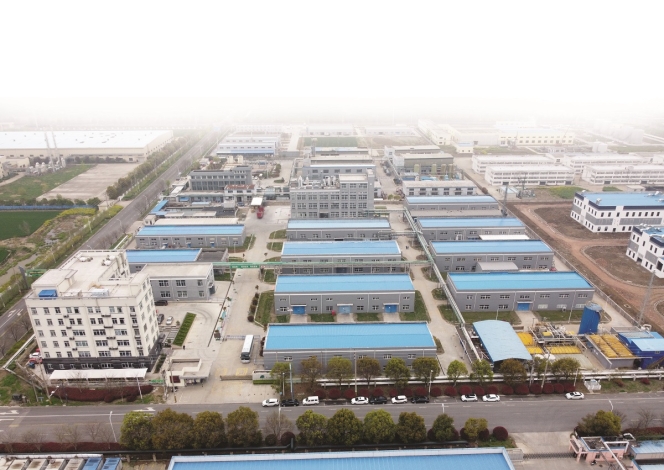
As sustainability becomes central to the tyre industry’s evolution, the spotlight is now shifting from just recyclability and circularity to a newer, promising domain – bio-based materials. While global tyre manufacturers invest heavily in de-carbonisation strategies, companies like Shanghai Cheeshine Novel Materials Technology Co., Ltd. are at the forefront of pushing this transition further. With a growing portfolio of innovative, high-performance bio-based solutions, Cheeshine is betting on the increasing demand for greener alternatives. However, as industry adoption remains cautious, especially in replacing petroleum-derived materials, the road to mainstream acceptance of bio-based materials may still require both technological refinement and a stronger market-driven pull.
Sustainability, recyclability, circularity and renewable materials are the main keywords of the current tyre industry. Companies have invested millions in its efforts towards reaching sustainability goals and attaining a circular economy.
But there is also a new buzz word in town – bio-based raw materials. Cheeshine is confident that the tyre industry has developed an interest towards such materials in its quest towards a sustainable future.
Speaking exclusively to Tyre Trends, the company’s Director of Research and Development Centre, Hai Li, said, “Our goal is to support the rubber industry’s sustainable development. That’s why we’ve selected certain bio-based materials, and through modification, enhanced their properties to make them suitable for rubber applications. There’s growing demand for bio-based materials in tyres due to increased environmental awareness and the need for greener alternatives.”
Founded in 2005 in Shanghai, the company delivers different products and services to the rubber industry. Over more than a decade of growth, the company has expanded its footprint with factories and offices in Jiangsu Huai’an, Jiangsu Suzhou, Shandong Linyi, Hong Kong, Chongqing, Tianjin, India and France, serving a global customer base.
It maintains long-term collaboration with leading Chinese universities and in 2016 established the ‘Cheeshine Scholarship’ at the School of Polymer Materials, Qingdao University of Science and Technology to support innovation in research and development.
With strong research and development capabilities and large-scale production capacity, Cheeshine offers six core product categories including low rolling resistance silane, high-temperature resistant cross-linking agents, wet-skid resistant resins, adhesion promoters, special reinforcing fillers and environmentally friendly processing oils.
It currently holds 108 patents and several technologies for which it has filed PCTs. A standout example is its high dispersion precipitated silica by carbonisation, the precipitated silica via CO₂ substitution for sulfuric acid, a process that currently sets it apart as the only manufacturer with this capability.
MANUFACTURING PROWESS
The company focuses on the ‘magic triangle’, which, in the tyre industry, is referred to the balance between three critical performance factors viz-a-viz rolling resistance, wet grip and wear resistance.
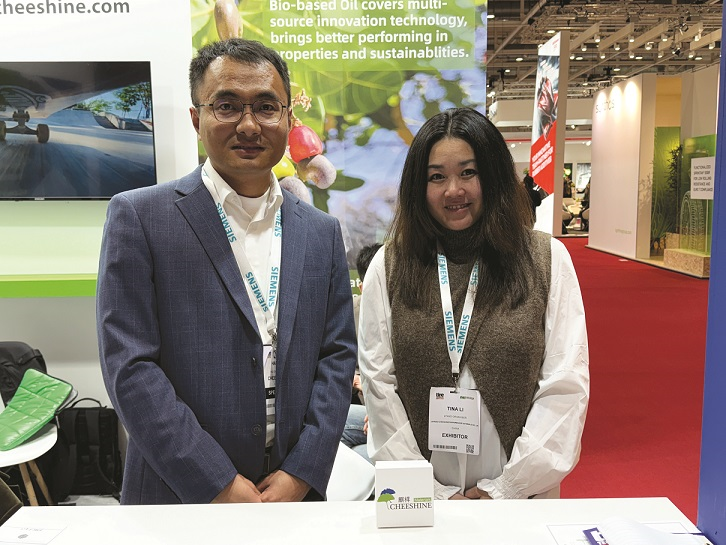
Cheeshine Materials manufactures through its three factories in China and ships worldwide. Its research and development hubs are also located within the country. “We’re a research and development-driven company. Our largest development centre is in Suzhou with over 80 team members, most of whom hold master’s or doctoral degrees. We have a total of three R&D centres. Our teams work closely with clients to co-develop customised and high-performance solutions. We have two main production bases – one in Hua’an, Jiangsu Province, and another in Shandong Province,” said Li.
The company registered a turnover of USD 120 million in 2024 and serves a global base of over 500 customers. Within the tyre industry, it majorly works with the global top 10.
Li expressed pride in the company’s innovations and emphasised on the broad portfolio of rubber additives and sustainable materials. Claiming that the company has a strong market presence both in China and internationally, he provided an overview of the core offerings.
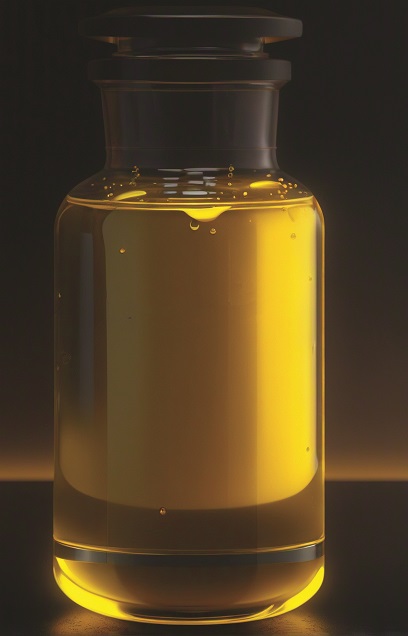 Under the category of bio-based products, Li highlighted a rubber processing oil derived from modified cashew nut shell oil, a product he claimed is manufactured in China only by his company. This oil not only improves compatibility with rubber compounds but also contributes to sustainability. Another innovation was the modified natural rubber (epoxidised NR), developed to serve as a bio-based alternative to synthetic SSBR, offering enhanced performance.
Under the category of bio-based products, Li highlighted a rubber processing oil derived from modified cashew nut shell oil, a product he claimed is manufactured in China only by his company. This oil not only improves compatibility with rubber compounds but also contributes to sustainability. Another innovation was the modified natural rubber (epoxidised NR), developed to serve as a bio-based alternative to synthetic SSBR, offering enhanced performance.
In terms of eco-friendly fillers, he pointed to the high-dispersion precipitated silica by carbonisation, which is more environmentally friendly than traditional sulfuric acid-derived silica and also improves dispersion in rubber compounds. He also mentioned a high-performance liquid rubber additive known for its excellent compatibility and market success.
For advanced functional additives, he cited the modified silane coupling agent, designed to replace TESPT and improve rolling resistance and silica dispersion and currently protected under a PCT patent. The company’s multi-functional cross-linking agent enhances durability and strength, while a line of environmentally friendly accelerators was developed to minimise environmental impact during vulcanisation.
The portfolio also includes speciality resins such as a tear-resistant resin for improved tyre durability and several wet skid-resistant resins, including AMS and modified AMS resin, hydrogenated resin, bio-based resin and modified C5/C9 resin, targeted at enhancing grip on wet surfaces. Additionally, the company produces various phenolic and formaldehyde resins for specific performance attributes like heat resistance and bonding, along with anti-reversion agents and silica dispersion agents that support high-performance compound development.
Among the company’s most cutting-edge innovations is a sulfur-free curing agent, an alternative that replaces traditional sulfur in rubber vulcanisation and enhance tyre ageing resistance and wear resistance while significantly boosting overall durability performance. This agent helps reduce tyre cracking over time and extend product life. Li noted that Cheeshine Materials is currently the only company globally manufacturing this agent and has secured a PCT patent for it.
When asked about the source of their materials, Li acknowledged that while many of the older products were petrochemical-based, the company is now strongly shifting towards bio-based alternatives including bio-oils, resins and natural rubber modifications, in alignment with the industry’s evolving sustainability goals.
MARKET TALK
While the company has a kitty of impressive offerings that might cater to the emerging and evolving demands of the tyre industry, replacing traditional materials completely is a matter that is to be taken up in the near future. Of all the raw materials that go into a tyre, replacing synthetic rubber seems to be a very vague concept for many.
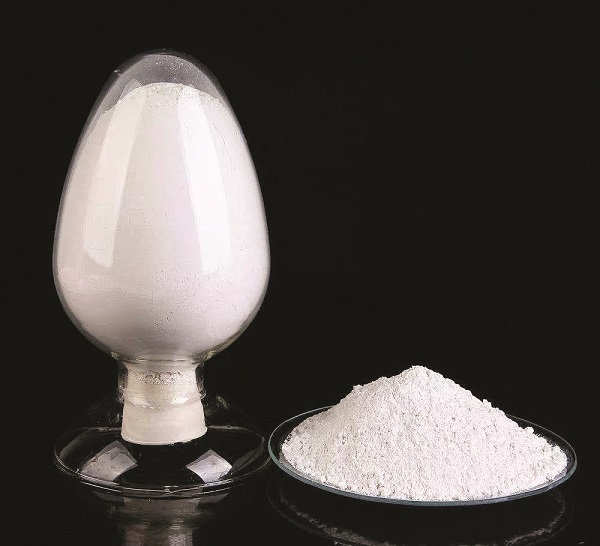 Alluding to why the industry will choose modified natural rubber over SSBR, Li explained, “Modified natural rubber offers higher bio-based content, which supports sustainability goals. Through our proprietary modifications, we enhance its ageing, physical and dynamic properties, making it a strong alternative to synthetic rubber.”
Alluding to why the industry will choose modified natural rubber over SSBR, Li explained, “Modified natural rubber offers higher bio-based content, which supports sustainability goals. Through our proprietary modifications, we enhance its ageing, physical and dynamic properties, making it a strong alternative to synthetic rubber.”
Commenting on challenges, Li said, “Our main challenge is the constant push to develop better products and solutions. Innovation is an ongoing effort. We’re continually working to modify bio-based materials like lignin. Many projects are ongoing, focused on improving sustainability and performance. On the cost front, we aim to keep the cost of our new products on par with conventional ones while providing the added value of sustainability.”
Li described that the business is fairly balanced between domestic and international markets. In terms of global expansion, he mentioned that growth is being driven through a network of affiliates and distributors. The company already has team members based in Paris, Copenhagen and Mumbai and are actively engaging with international partners to access new markets.
In response to questions about the shifting dynamics in Europe, particularly with some local plants shutting down, Li noted that the company is continuing to expand its manufacturing capacity in China. He cited the country’s cost advantages and strong pool of research and development talent as key factors. Looking ahead, the company plans to strengthen its presence in Europe by hiring more local technical support staff to better serve the region.
As for establishing a manufacturing plant in Europe, Li shared that there are no immediate plans to do so. However, the company may consider this move in about two or three years, particularly after the full commissioning of the new domestic plant as part of a longer-term strategy to navigate tariffs and support local demand.
When asked about the future vision, Li stated that Cheeshine Materials’ ambition is to become a true pioneer of the unexplored territories in the rubber industry. The focus remains on leading innovation and continually expanding the company’s global influence.
KraussMaffei Technologies Appoints Dirk Musser As New Managing Director
- By TT News
- February 27, 2026

KraussMaffei Group is set to implement a leadership transition at its subsidiary, KraussMaffei Technologies, with a change at the board level. Jörg Stech, who has served as Chairman of the Board and global head of injection moulding, automation and additive manufacturing since 2023, will be departing on 31 March 2026 at his own request. He will be succeeded by Dirk Musser, the current Head of Group Transformation at the parent company, who has been appointed as the new Managing Director effective 1 April 2026. The leadership handover between Stech and Musser is already in progress, ensuring a seamless transition.
Stech’s tenure unfolded during a difficult economic period marked by financial losses and a contracting market. He responded with decisive measures aimed at margin enhancement and balance sheet improvement, which laid the groundwork for the company's long-term stability. Under his direction, the product lineup for injection moulding and automation was revitalised with the introduction of the LRXplus linear robot, the fully electric PX series and the MC7 control system, all launched in late 2025 alongside new artificial intelligence tools. He also launched a multi-year development initiative and pushed the company into new markets, such as aerospace and drone technology, by leveraging expertise in specialised processes like ColorForm. Through a focus on operational excellence, pricing discipline and capital efficiency, Stech guided the company to a significantly more resilient position compared to three years prior, despite the persistent downturn in injection moulding.
Musser brings to his new role extensive experience in transformation and finance. In his current capacity, he has already been closely involved with KraussMaffei Technologies, collaborating with its leadership to drive strategic initiatives and enhance operational performance. His qualifications include sharp analytical abilities, a strong grasp of industrial processes and a broad international perspective. An economist by training, Musser has accumulated over 20 years of leadership experience across various technology and industrial sectors. His background includes leading major transformation and turnaround projects at CRRC New Material Technologies, where he stabilised plant earnings in North America, as well as directing operational and financial restructurings during his time at Deloitte. He has also held roles with P&L responsibility, managing global supply chains and post-merger integrations at CRONIMET and has prior experience with automotive manufacturers including Daimler and Fujian Benz Automotive in China.
Alex Li, CEO, KraussMaffei Group, said, "Jörg Stech took on responsibility in a difficult situation, set clear priorities and launched decisive initiatives. The successful market launch of the LRXplus linear robot and the all-electric PX machine series, the consistent focus on profitability and the sustainable strengthening of our balance sheet are visible results of this work. We would like to express our sincere thanks to Jörg Stech for his leadership, integrity and team spirit. We value Dirk Musser as a leader who combines strategic clarity with operational excellence. In a short period of time, he has provided vital impetus for the transformation of the group and impresses with his analytical strength, decisiveness and deep understanding of our processes – not least through his successful collaboration with the managing directors of KraussMaffei Technologies. We are convinced that he will continue on this path with clarity and creative drive to successfully align KraussMaffei Technologies."
Stech said, "After many years in an environment full of technological, economic and geopolitical challenges, I look back with great gratitude on a time in which I was always surrounded by an exceptional workforce. Together, we achieved things that many initially thought were impossible. This cooperation, this willingness to push boundaries and create something new, was a joy for me. My special thanks go to all stakeholders in the company and, of course, to all employees. I leave with respect, gratitude and the conviction that this long-established company will continue to achieve great things in the future."
Musser said, "Together with my fellow managing directors Dr Frank Szimmat and Markus Bauer, I want to resolutely drive forward the further development of KraussMaffei Technologies. Our focus is on further expanding stability and performance and taking the necessary steps to successfully position the company in a dynamic market environment. I look forward to shaping this path together with our teams.”
Dario Marrafuschi Succeeds Mario Isola As Pirelli’s Head Of Motorsport
- By TT News
- February 27, 2026
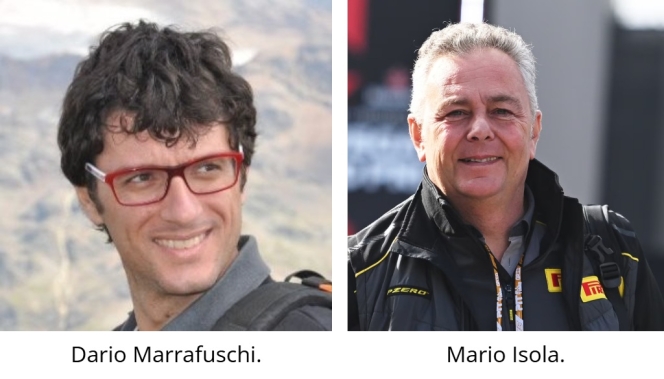
Italian tyre manufacturer Pirelli has announced that Dario Marrafuschi will become the Head of its Motorsport Business Unit, effective 1 March. He succeeds Mario Isola, who will remain with the company until 1 July to assist with the leadership transition.
Marrafuschi joined Pirelli in 2008 and has held positions within the Formula 1 Research and Development department. Most recently, he led the development of the company's road products.
He will report to Giovanni Tronchetti Provera, Executive Vice-President of Sustainability, New Mobility & Motorsport. The appointment comes as the company continues its role as the tyre supplier for various global motorsport categories.
Isola departs the company following a tenure that included the expansion of Pirelli’s motorsport operations. The company stated that Isola will pursue other professional opportunities following his departure in July.
Changing Tyre Dynamics In A Changing Car Market
- By Sharad Matade
- February 27, 2026
For Continental Tires India, the passenger vehicle market in India is entering a phase where scale and structure are finally aligning with its longstanding premium ambitions. Passenger vehicle sales reached a record 4.3 million units in 2024, expanding by 4–5 percent year on year, but it is the composition of that growth – rather than the headline volume – that is reshaping the company’s strategy. Utility vehicles now account for approximately 58 percent of total passenger vehicle sales, up sharply from about 51 percent the previous year, cementing SUVs and crossovers as the dominant force in the market.
This structural shift has direct consequences for tyre manufacturers operating at the upper end of the value spectrum. Larger vehicles bring higher kerb weights, bigger wheel diameters and greater expectations around refinement, safety and performance. For Continental, the change represents not merely an increase in addressable demand but a decisive move towards tyre categories where technology differentiation and pricing discipline can coexist.
Samir Gupta, Managing Director of Continental Tires India, calls this phase a turning point, not a temporary high. He says the surge in utility vehicles – driven by electrification and more premium cars – fundamentally changes the economics of the passenger tyre market in India.
“Let me clarify one thing first. The utility vehicle segment is no longer small. Last year, around 60 percent of passenger vehicles sold in India were utility vehicles, and including first-time buyers upgrading within this segment, the share goes beyond 65 percent,” Gupta says.

Industry data broadly supports this assessment. SUVs alone contributed close to three-fifths of all passenger vehicle sales in 2024, with compact utility vehicles accounting for a significant share of incremental volumes. The overall passenger vehicle market, at around 4.3 million units, has thus become structurally skewed towards larger formats – an inflection with long-term implications for tyre sizing, load ratings and product mix.
This shift shows in replacement demand. As vehicle footprints grow, rim diameters are increasing. “The market is clearly moving from smaller to bigger rim sizes. Demand for 17-inch and above tyres is rising sharply,” Gupta says. While these tyres are still a minority, their growth far outpaces the overall passenger tyre market.
Electrification is accelerating the shift. A substantial proportion of electric passenger vehicles sold in India today are SUVs, and Continental expects EVs to account for more than 50 percent of the passenger vehicle segment within five years. For tyre manufacturers, this creates new technical requirements – higher torque tolerance, lower rolling resistance and stringent noise control. “That creates a significant opportunity for us because our strengths lie in premium, high-performance tyres,” Gupta says.

Despite these favourable structural trends, premium tyres have historically struggled to gain traction in India. For much of the past decade, the market remained intensely price-sensitive, with tyres treated largely as commoditised replacement items. Continental’s response, Gupta explains, has been consistent rather than tactical pricing. “Right from the beginning, we have focused on fair pricing. The idea is simple – if we can clearly differentiate on performance and consistently deliver on those promises, price recovery will follow,” he explains.
The broader environment is now becoming more supportive. As vehicle prices rise and consumers migrate towards larger, more sophisticated vehicles, willingness to spend on tyres that enhance safety, comfort and driving confidence is increasing. This trend is also evident at the top end of the market. Premium and luxury passenger vehicle sales reached approximately 51,500 units in 2024, up around 6 percent year on year and crossing the 50,000-unit threshold for the first time – a symbolic marker of premium consumption in India.
Gupta sees premiumisation extending beyond luxury vehicles. “Earlier, India was extremely price-sensitive, but that is changing in higher segments. Consumers are upgrading vehicles and are more willing to invest in tyres that enhance safety, comfort and confidence,” he says.
The intensification of competition, with global premium tyre brands expanding or re-entering India, is viewed as a positive development. “Competition is always good,” Gupta says. “It gives you room to grow and improve.” More importantly, he believes it will help reframe the market. “More premium players will help move the market away from being purely cost-driven to being value-driven,” he adds.
Replacement market dynamics reinforce this view. Of the roughly 32–33 million passenger tyres replaced annually in India, tyres sized 17 inches and above account for about 12–13 percent. While the overall replacement market grows at 5–6 percent per year, this high-diameter segment is expanding at over 20 percent annually, closely tracking the shift in new vehicle sales.
This sharper focus on passenger tyres also explains Continental’s decision to exit the truck and bus radial segment in India. Gupta stresses that the decision was strategic rather than operational. Continental entered the TBR market in 2014, invested significantly and received strong feedback on product performance.
However, the economics proved limiting. Gupta says, “TBR in India is largely a B2B, fit-for-purpose market. Even if you have the best tyre, willingness to pay remains limited because fleet operators are under constant margin pressure.” Although commercial tyres offer higher absolute margins per unit, they consume substantially more raw material. “One commercial tyre uses six to eight times the raw material of a car tyre. Percentage margins are actually higher in passenger tyres,” Gupta explains.
After reviewing its portfolio, Continental chose focus over breadth. Exiting TBR allows the company to concentrate capital, technology and management attention on passenger and light truck tyres, where differentiation is more readily monetised. Gupta rejects the idea that a narrower portfolio weakens the company’s position. Commercial and passenger tyre customers, he argues, are fundamentally different – one driven by procurement economics, the other by consumer perception and emotion.
Indian consumers, Gupta believes, are becoming more tyre-aware. “Premiumisation is happening across the vehicle industry, not just in tyres. As consumers move to larger and more premium cars, their expectations also rise,” he says. Where tyres were once treated as an afterthought, buyers increasingly recognise their role in braking, grip, noise and overall driving confidence.
This change is evident at the retail level. Continental now operates more than 200 brand stores across India, and feedback from retail partners suggests customers are more informed and more demanding. Availability remains critical. “There is no point launching premium tyres if customers cannot find them,” Gupta says.
To support future demand, Continental is investing around INR 1 billion at its Modipuram plant, with the focus squarely on passenger and light truck tyres. The expansion will extend manufacturing capability from the current 20-inch limit to 22–23 inches, aligning local production with emerging vehicle trends.
Localisation, Gupta argues, is about adaptation rather than compromise. Indian road conditions, climate and driving habits require specific tuning without diluting global performance standards. Education and availability remain the principal challenges.

The recent launch of the CrossContact A/T² in India reflects this strategy. Introduced during Continental’s Track Day at Dot Goa 4x4, the product positions India among the early global markets for the tyre. “The first thing you notice is noise – or the lack of it,” Gupta says. “You hear the air-conditioning, not the tyre.” Ride comfort, grip and consistency across terrains define its appeal. As Gupta puts it, “Jahan tak soch jaati hai, wahan tak yeh tyre kaam karta hai.”
Looking ahead, Continental remains largely insulated from shifts in original equipment strategies, such as the gradual removal of spare tyres. Improved carcass design and stronger sidewalls are reducing puncture risk, but the company’s primary focus remains the replacement market.
For Gupta, the question is no longer whether India is ready for premium tyres, but how effectively manufacturers execute. “The market is finally ready for premium tyres,” he concludes. With passenger vehicle sales at record levels, SUVs firmly dominant and premium consumption expanding, Continental believes it is well positioned to grow alongside India’s evolving mobility landscape.
Falken Tyre Europe GmbH Rebrands As DUNLOP Tyre Europe GmbH
- By TT News
- February 26, 2026

Falken Tyre Europe GmbH has officially transitioned to operating under the name DUNLOP Tyre Europe GmbH, following its formal registration with the Offenbach Local Court. This change signifies a pivotal development for the Sumitomo Rubber Industries subsidiary. The rebranding represents a calculated and essential move to establish a more formidable European footprint for the DUNLOP brand. Company leadership acknowledges that this evolution is built upon the considerable equity established by Falken, including its strong market recognition, unwavering product quality and the commitment of its personnel.
This strategic shift positions the organisation under the umbrella of a globally respected marque, with its future strategy firmly centred on expansion, pioneering advancements and ecological responsibility. A prominent symbol of this new chapter will be unveiled shortly, with the renaming of the DUNLOP City Tower in Offenbach. A formal ceremony will mark the occasion, featuring the presentation of the DUNLOP logo at the tower. The event is set to be attended by Offenbach's Lord Mayor, Dr Felix Schwenke, alongside the company’s managing directors, Hiroshi Hamada and Markus Bögner, and the newly enlarged DUNLOP team.
Markus Bögner, Managing Director and President, DUNLOP Tyre Europe GmbH, said, “The name change is an important milestone of which we can be very proud. It strengthens our identity and underlines that we are ready for the next steps. Our strong heritage with Falken is and remains part of our success, laying the foundations for DUNLOP’s future in Europe. Our thanks go to all our employees and partners who have supported and accompanied us on this journey.”







Comments (0)
ADD COMMENT